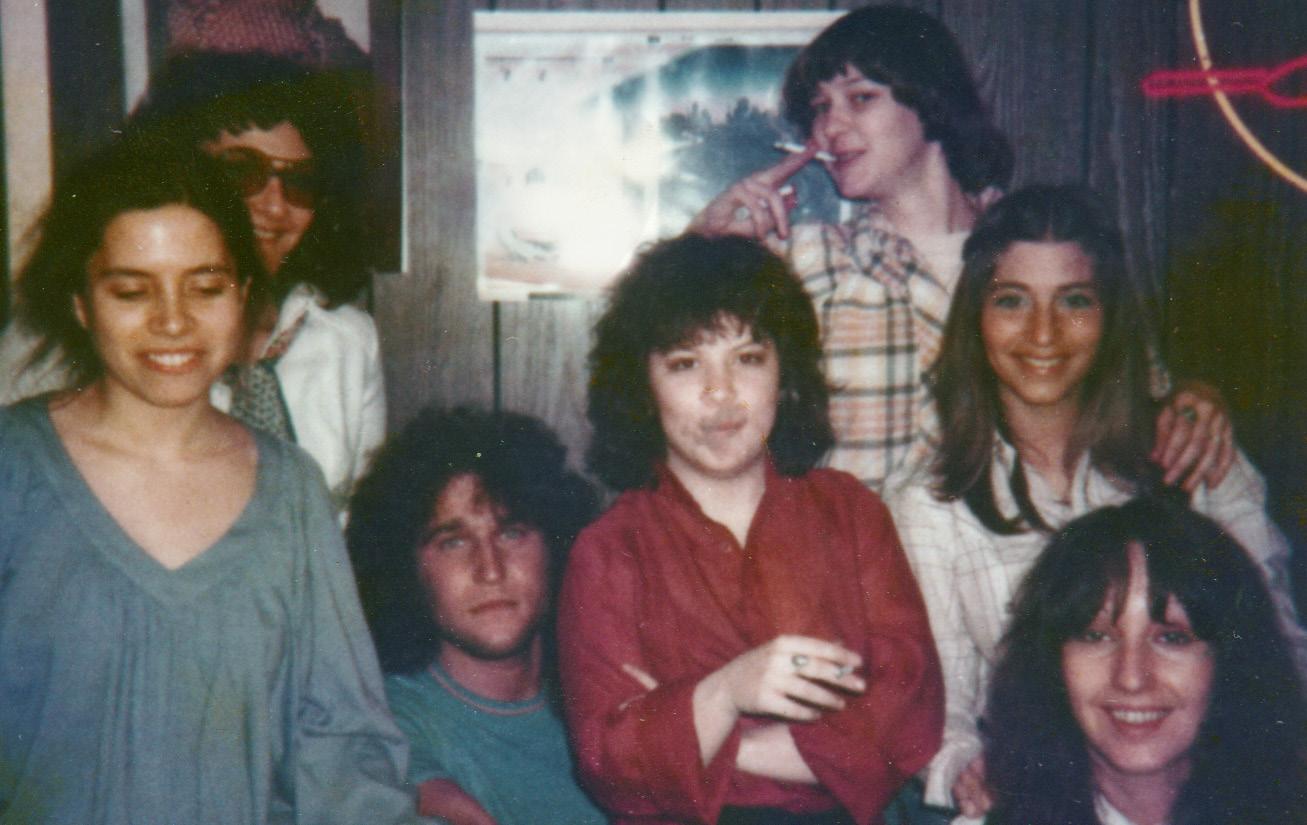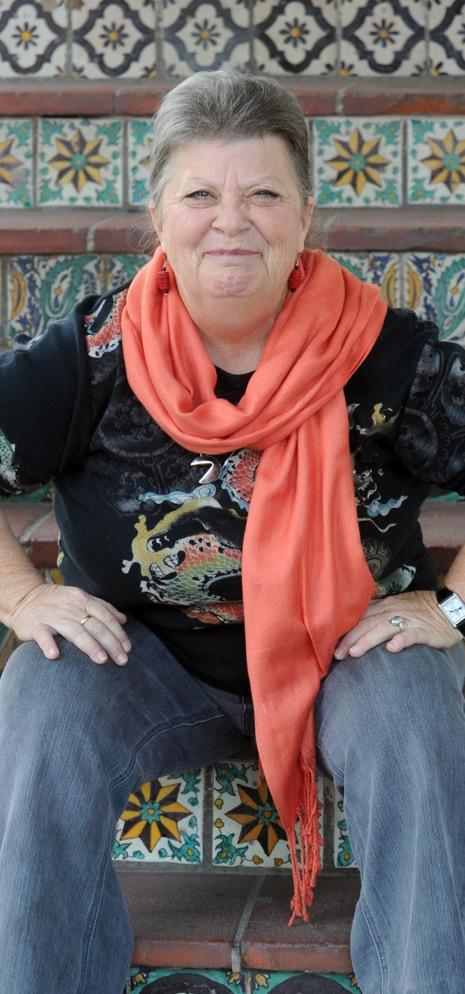
6 minute read
High Times with Mo
By Melinda Bie
Maureen “Mo” McFadden has long been a cannabis supporter, and after back surgery in 2016, she has become even more of an advocate, as cannabis allowed her to wean off oxy-contin, which in turn aided in her quick recovery. All with the full support and encouragement of her surgeon.
Advertisement
Despite her diminutive stature, Mo is a powerhouse. Raised in the suburbs of Philadelphia, her life has been a rollercoaster of adventures and experiences she wouldn’t trade for the world. A “school of life” graduate, she came up through the ranks and has been at the helm of McFadden & McFadden Public Relations in Santa Barbara for the past 29 years.
Early in her career she worked as assistant to Tom Forcade, the editor and founder of pop-icon High Times magazine, a then-new publication devoted to drug culture. Cannabis by the Sea sat down with Mo to learn a little more about this experience and what it was like to be entrenched at such a volatile time and boy did we get a story...
How’d the interview go?
He asked if I knew about the magazine and I told him yes and loved it. He said nonchalantly, ‘so, you don’t mind drugs?’ I said ‘no, I do them as often as I can’ – with a straight face. Probably the only interview I could have said that in and STILL have gotten the job. The pay was $200 a week, $40 more than the club - it was like getting an extra week of pay and I would be working for a magazine I adored.
Any memorable moments?
I remember rolling a joint for Tom and putting it on top of his mail about a week or two after I started. He called me in and asked pointedly ‘what is this?’ I said, it’s a thank you joint I rolled for you. ‘oh’ he replied softly, genuinely surprised and mumbled something like “No one ever gives me a joint.” I explained I knew he was high profile and the cops or feds were always watching him so he couldn’t have anything on him. Nothing like a joint with coffee while going over the mail to ease him into the day. My small gesture meant a lot to him.
What were you doing prior to going to High Times?
I was working for the owners of a nightclub in the Village in New York City - The Bottom Line. Always thought that was a poetic move - from The Bottom Line to High Times. The woman who did marketing for the club knew a man in the High Times ad department who told her of a position that was open. They told me it was an assistant position for one of the editors - not the guy who founded the damn magazine [Tom Forcade]. Holy S**t! I would have been more nervous if I’d known.
During the interview I used humor, and apparently my typing speed and vocabulary were part of the approval. Having experience as an executive secretary for a few unusual people was on my resume which gave him confidence I was the right woman for the job.
How did the magazine launch?
In 1973 when Tom was making plans for the magazine, the mere mention of or use of recreational drugs outside the High Times offices was taboo. How would he distribute the magazine to get the sales he needed to keep the mag going? How would he find the people who wanted to know more? One of the women he worked with devised a unique idea – a distribution network using paraphernalia stores as our outlet. Because of this innovative thinking, the first issue of High Times holds publishing gold—the only magazine to start publishing in the black. Our subscribers received their copies in a plain brown wrapper.

Mo McFadden is third from left in red shirt and smoke in front of her face.
What was the general mood at work? Clandestine? Cheech and Chong? Rebel? Or?
The mood at the office was all of that. It was the most radical place I’ve ever worked, at the same time very professional; after all, we got a magazine out every month on time with a three-to-four-month lead. High Times was pop culture at its finest, so very interesting, everyone wanted to know you, often glamorous, filled with fascinating people, and unusual projects. It was truly a high time. Never dull. Plus, I could roll a joint at my desk and smoke it—as long as I shared.
As his assistant, what did you do? What expertise did you lend? What did you learn?
Tom was a theatrical prankster and so my theatre background played well into this job.
I was his first and only secretary. He had an image of a 40-something woman who could take dictation and type like a banshee. They had a few women like that come in, but as soon as they saw the lobby of High Times, or smelled the pot, they quickly turned and went back down the elevator. Not me. I did all the secretarial things an executive secretary was meant to do, organize and file, take a letter, field his phone calls and mail, be at the weekly staff meetings, organized meetings and worked on special projects for him. Oh, and be aware of the Feds who were listening in to our conversations. I could hear the telltale clicking once I was hip to it. Rule was, be careful about what’s being said. Big brother was listening.
Tom’s death must have had quite an impact on the staff and morale at the magazine.
It was devastating. He committed suicide. He was only 33. Morale went into the crapper. Everyone, I mean everyone, was in shock. Tom was at St. Vincent’s Hospital barely hanging on. Many of us went down to see him to bid farewell. It was like we lost the rudder to our boat. He was always so unpredictable. This was the height of unpredictable. It was November 17, 1978, he was taken off life support on the 18th.

Maureen "Mo" McFadden
Paul Wellman
What happened next?
The staff decided to have a “high” send-off for Tom’s ashes. We held a memorial (party) at the Windows on the World, the restaurant at the top of the World Trade Center. We tried to scatter his ashes off the top where there was some kind of viewing platform …to send him off the highest building in the world. As you can imagine the winds up at the top are stiff—stiffer than the drinks they served below. “Tried” is the operative word here.
Tom had created a trust for High Times and the magazine was to go to loyal employees after 25 years ... it began in 1974. His wife got the lawyers on it, and they were able to break the trust and take over the magazine. They broke my trust and lots of other employees too. I left by the end of ’79. There was no there, there anymore. I went on unemployment and did odd jobs under the table. Enjoyed the city, saw a lot of shows. Partied liberally, of course.
What can the average cannabis supporter do to advocate for the industry as a whole?
Support NORML – The National Organization for the Reform of Marijuana Laws. I’ve been a member for many moons. I give $4.20 to the organization on 4/20. We need to get cannabis off the Fed’s list. It will open up safe financial options for the dispensaries and storefronts and take the mixed message the states and the police/ enforcers have to contend with where it’s legalized.
In business since 1992, Maureen “Mo” McFadden is sole owner of McFadden & McFadden P.R. based in Santa Barbara. (805) 689-5053. Visit mcfaddenpr.com for more information. – CBTS Staff










